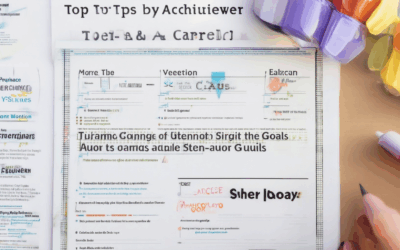In today’s fast-paced work environments, managing stress has become a critical challenge for many professionals. Finding effective strategies to reduce work stress is essential for maintaining productivity and fostering a healthy work-life balance. This article delves into proven techniques and approaches that can help you manage stress in the workplace, offering insights into practical daily habits, mental health practices, and long-term lifestyle changes to achieve a more balanced and fulfilling work experience.
Key Takeaways
- Prioritize Tasks: Focus on high-priority tasks to boost productivity and reduce stress from overwhelming responsibilities.
- Take Regular Breaks: Use techniques like the Pomodoro method to maintain focus and prevent burnout.
- Practice Mindfulness: Engage in quick meditation or deep breathing to reduce anxiety and improve mental clarity.
- Set Clear Boundaries: Separate work from personal life to protect mental health and ensure work-life balance.
- Limit Multitasking: Concentrate on one task at a time to boost efficiency and reduce mental fatigue.
- Seek Support: Talk to colleagues or mentors to gain perspective and reduce feelings of isolation.
- Stay Active: Incorporate physical activity during work to improve mood and circulation.
These strategies provide a roadmap for reducing work stress and enhancing overall well-being in the workplace.

Strategies to Reduce Work-Related Stress
Reducing work-related stress is essential for maintaining both professional and personal well-being. Below are proven strategies to help manage stress effectively:
- 1. Practice Effective Time Management
- Prioritize tasks based on urgency and importance using the Eisenhower Matrix.
- Break larger projects into smaller, manageable tasks.
- Use tools like calendars and to-do lists to organize your day.
- 2. Incorporate Mindfulness and Meditation
- Take short, regular breaks to practice deep breathing exercises.
- Mindfully observe your thoughts and feelings during stressful moments.
- Consider guided meditation apps like those available on 7Del.net for additional support.
- 3. Engage in Physical Activity
- Take walking breaks or incorporate light exercise during work hours.
- Stretch or do simple yoga sessions at your desk.
- Regular physical activity helps reduce stress hormones like cortisol.
- 4. Maintain a Healthy Diet and Sleep Routine
- Consume nutrient-dense foods to fuel your body and brain.
- Avoid excessive caffeine or sugar intake, which can increase stress.
- Ensure adequate sleep by establishing a consistent bedtime routine.
- 5. Limit Multitasking
- Focus on one task at a time to improve efficiency and reduce overwhelm.
- Use techniques like the Pomodoro Technique to maintain focus.
- 6. Set Clear Boundaries
- Communicate your availability outside of work hours to employers.
- Use tools like email filters to separate work and personal messages.
- 7. Seek Support and Build a Strong Network
- Share your challenges with trusted colleagues or mentors.
- Join professional groups or forums to connect with others facing similar issues.
- Consult with a therapist or counselor if stress becomes overwhelming.
By implementing these strategies, you can create a more balanced and fulfilling work environment. Remember to visit 7Del.net for additional resources and guides on maintaining mental health and productivity.
How Can I Reduce Work Stress?
To reduce work stress, consider implementing the following strategies:
- Set Clear Boundaries : Separate work and personal life by establishing specific work hours and avoiding work-related tasks outside these times.
- Time Blocking : Organize tasks into focused time blocks to enhance productivity and reduce feelings of overwhelm.
- Practice Mindfulness : Use mindfulness or meditation apps like Headspace or Calm for short daily sessions to stay grounded.
- Engage in Physical Activity : Incorporate light exercises such as walking or stretching during breaks to boost mood and energy levels.
- Break Tasks into Smaller Steps : Use techniques like the Pomodoro Technique to tackle tasks in manageable chunks, reducing the feeling of being overwhelmed.
- Seek Social Support : Connect with colleagues or mentors who may offer guidance or simply listen, helping to alleviate stress through shared experiences.
- Prioritize a Healthy Lifestyle : Maintain a balanced diet and ensure adequate sleep to support overall well-being and stress reduction.
- Learn to Say No : Communicate effectively with your manager to set realistic expectations and avoid overcommitting.
- Implement Mindful Breathing Exercises : Practice deep breathing exercises to quickly calm yourself when stress arises.
- Seek Professional Help When Needed : Don’t hesitate to consult a counselor or therapist if stress becomes overwhelming.
By integrating these strategies, you can create a more balanced and productive work environment, ultimately reducing stress and enhancing your overall well-being.

Effective Strategies for Reducing Work Stress
Reducing work stress is essential for maintaining productivity and overall well-being. Below are proven strategies that can help you manage stress and thrive in your professional environment:
1. Prioritize Self-Care
Regular self-care practices are crucial for managing stress. Incorporate activities like mindfulness meditation, deep breathing exercises, or short walks during breaks. These techniques can help you reset your mind and reduce tension.
2. Set Clear Goals
Feeling overwhelmed often stems from unclear objectives. Break down larger tasks into smaller, manageable steps. This approach helps you track progress and feel more accomplished, reducing anxiety.
3. Limit Distractions
Unnecessary interruptions can waste time and increase stress. Use tools like noise-canceling headphones or apps to block out distractions, allowing you to focus on critical tasks efficiently.
4. Practice Gratitude
Focusing on the positive aspects of your job can significantly reduce stress. Take a few moments each day to acknowledge what’s going well, fostering a more optimistic mindset.
5. Improve Time Management
Overcommitting can lead to burnout. Learn to say no when necessary and allocate time for breaks. This ensures you’re working smartly, not just hard, which can enhance productivity and reduce fatigue.
6. Connect with Colleagues
Building strong relationships at work can provide support and reduce feelings of isolation. Schedule regular check-ins with teammates to foster collaboration and camaraderie.
7. Seek Feedback
Constantly seeking feedback helps identify areas for improvement and builds confidence. Approach reviews as opportunities for growth rather than criticism.
8. Stay Organized
A cluttered workspace can hinder focus and increase stress. Invest in organizational tools that help you keep your workspace tidy and your tasks aligned with priorities.
9. Engage in Physical Activity
Regular physical activity is a powerful tool for managing stress. Even a short walk or some light stretching during breaks can boost energy levels and improve mood.
10. Utilize Resources
Your organization likely offers resources for workplace wellness. Explore programs like employee assistance programs or wellness challenges to find support tailored to your needs.
By implementing these strategies, you can create a more balanced and fulfilling work experience. Remember, taking care of yourself is just as important as meeting deadlines.
For more insights on workplace wellness, explore our guide to creating a healthier work environment .

Effective Strategies for Reducing Work Stress
- Prioritize Tasks: Use a to-do list to focus on high-priority tasks and delegate or eliminate less critical responsibilities.
- Taking Regular Breaks: Implement the Pomodoro Technique (25 minutes work, 5 minutes break) or simply step away from your desk every hour to refresh your mind.
- Practice Mindfulness: Engage in deep breathing exercises or brief meditation sessions during work to reduce anxiety.
- Set Clear Boundaries: Establish a routine by leaving work at a specific time each day and avoiding work-related discussions outside of work hours.
- Limited Multitasking: Focus on one task at a time to enhance productivity and reduce mental fatigue.
- Seek Support: Talk to a trusted colleague or mentor if you’re feeling overwhelmed and share your concerns to gain perspective.
- Stay Active: Incorporate regular physical activity, such as a short walk or stretching, to alleviate stress and improve circulation.
For more insights and resources on workplace wellness, visit 7Del.net to explore additional strategies and expert advice on managing stress effectively.
Effective Strategies for Reducing Work Stress
Reducing work stress is essential for maintaining productivity and overall well-being. Below are proven strategies that can help you manage stress and thrive in your professional environment:
1. Prioritize Self-Care
Regular self-care practices are crucial for managing stress. Incorporate activities like mindfulness meditation, deep breathing exercises, or short walks during breaks. These techniques can help you reset your mind and reduce tension.
2. Set Clear Goals
Feeling overwhelmed often stems from unclear objectives. Break down larger tasks into smaller, manageable steps. This approach helps you track progress and feel more accomplished, reducing anxiety.
3. Limit Distractions
Unnecessary interruptions can waste time and increase stress. Use tools like noise-canceling headphones or apps to block out distractions, allowing you to focus on critical tasks efficiently.
4. Practice Gratitude
Focusing on the positive aspects of your job can significantly reduce stress. Take a few moments each day to acknowledge what’s going well, fostering a more optimistic mindset.
5. Improve Time Management
Overcommitting can lead to burnout. Learn to say no when necessary and allocate time for breaks. This ensures you’re working smartly, not just hard, which can enhance productivity and reduce fatigue.
6. Connect with Colleagues
Building strong relationships at work can provide support and reduce feelings of isolation. Schedule regular check-ins with teammates to foster collaboration and camaraderie.
7. Seek Feedback
Constantly seeking feedback helps identify areas for improvement and builds confidence. Approach reviews as opportunities for growth rather than criticism.
8. Stay Organized
A cluttered workspace can hinder focus and increase stress. Invest in organizational tools that help you keep your workspace tidy and your tasks aligned with priorities.
9. Engage in Physical Activity
Regular physical activity is a powerful tool for managing stress. Even a short walk or some light stretching during breaks can boost energy levels and improve mood.
10. Utilize Resources
Your organization likely offers resources for workplace wellness. Explore programs like employee assistance programs or wellness challenges to find support tailored to your needs.
By implementing these strategies, you can create a more balanced and fulfilling work experience. Remember, taking care of yourself is just as important as meeting deadlines.
For more insights on workplace wellness, explore our guide to creating a healthier work environment .

Best Strategies for Reducing Work Stress
- Mindfulness and Meditation
- Practice mindfulness daily to stay grounded and reduce anxiety.
- Use guided meditation apps like 7Del Mindfulness for structured sessions.
- Take short breaks during work to focus on your breath and reset your mind.
- Engage in moderate exercise like walking, yoga, or stretching during work hours.
- Visit 7Del Fitness for workout routines tailored for busy professionals.
- Schedule regular movement intervals to prevent sedentary habits.
- Aim for 7-9 hours of quality sleep each night to recharge your body and mind.
- Use 7Del Sleep for tips on improving sleep quality.
- Create a relaxing bedtime routine to signal your body it’s time to rest.
- Consume a balanced diet rich in fruits, vegetables, lean proteins, and whole grains.
- Stay hydrated throughout the day to maintain energy levels.
- Explore 7Del Nutrition for meal planning ideas.
- Separate work life from personal life by establishing specific working hours.
- Turn off work-related devices during downtime to minimize stress triggers.
- Use 7Del Time Management for tools to organize your schedule.
- Pursue activities you enjoy outside of work to boost mood and reduce stress.
- Join online communities like 7Del Hobbies to connect with others who share your interests.
- Allocate time weekly for creative expression or learning new skills.
- Become part of a supportive network or group to share experiences and solutions.
- Reach out to colleagues or mentors for advice and encouragement.
- Utilize 7Del Support for resources on building strong relationships.
- Stay updated with industry trends through courses and workshops.
- Invest in personal development to enhance both professional and personal growth.
- Explore 7Del Learning for curated learning resources.
By implementing these strategies, you can effectively reduce work stress and maintain a healthier work-life balance. Remember to be patient and kind to yourself as you adapt to these changes.




0 Comments